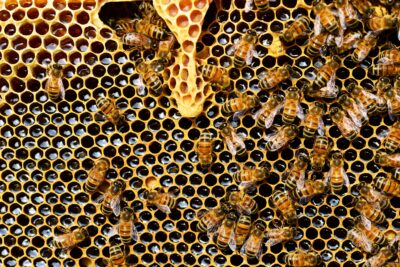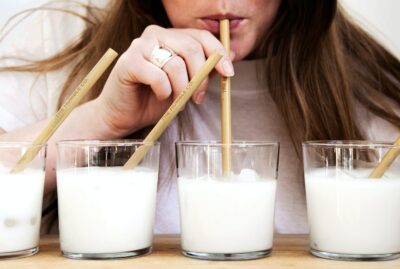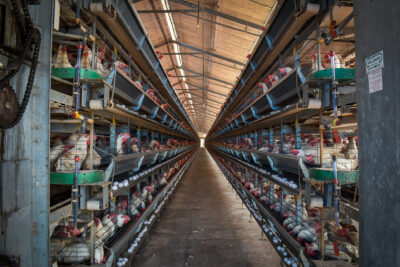In the wild, honey bees produce honey for themselves, not for humans. Commercial honey production involves the exploitation and deaths of countless bees. Bee farming can also negatively impact native, wild bee populations. Honey is not a necessary part of the human diet and there are many cruelty-free alternatives. This is why vegans don’t eat honey.
Is Honey Vegan?
The short answer is: no. Honey is an animal product, so this means it can never be vegan. This applies to all types of honey, whether raw, organic, Manuka, locally produced, etc.
What Is Vegan?
The word ‘vegan’ can be applied to products that do not come from animals and to people who do not buy, eat or wear any products that come from animals. In other words, someone can be vegan (for example, Joaquin Phoenix and Greta Thunberg) and something can be vegan (for example, synthetic leather and mushrooms). Honey is neither of these things!
Why Is Honey Not Vegan?
Just like milk produced by cows is not vegan and eggs laid by hens are not vegan, honey produced by bees is not vegan. Honey bees don’t make honey and willingly offer it up as a gift to humans, they make it for themselves. So, we shouldn’t steal it from them!
Honey Results From The Exploitation Of Bees
In the wild, honey bees produce honey as a food source. They feed it to their larvae to build strong, healthy colonies and they need it to survive over winter when there are no flowering plants to feed on. The honey that is on sale in supermarkets comes from commercial honey farms, which may contain thousands of hives each housing tens of thousands of bees. Hives have complex hierarchies, with each bee performing a specific role. Forager bees fly out to collect pollen and nectar and bring them back to the hive, typically visiting around 1,500 flowers and carrying back a cargo of nectar and pollen weighing around 80% of their body-weight. In the hive, worker bees convert nectar into honey (scroll down to the “Is honey bee vomit?” section to find out how). It takes 12 honey bees their entire lives to produce the total of just one teaspoon of honey. The labour of a lot of living beings is exploited in order to produce commercial quantities of honey. Honey producers use bees as money-making machines.
Honey Production Causes Bees To Suffer
Bees are living beings with brains and a central nervous system. They communicate with one another through dance-like movements and can recognise other bees. Although difficult to prove in insects, recent research suggests bees may experience pain. Commercial honey production causes suffering to bees at all stages of the process.
Just like with other farmed animals, bees on bee farms are selectively bred to produce large amounts of honey. To start a colony, a queen bee will be artificially inseminated with semen that has been collected from male bees, known as ‘drones’. The drones are crushed and killed in order to have their semen extracted. Queen bees can lay 2-3,000 eggs a day. Once the queen has been inseminated, she will have her wings cut off or clipped to prevent her from swarming (leaving the hive with her colony of bees to settle somewhere else).
Once a colony is established, forager bees fly out to harvest nectar and pollen and take it back to the hive where worker bees process it into honey. Bee-keepers take the honey and replace it with a cheap sugar substitute that does not contain the nutrients bees need. This can weaken their immune systems and make them more susceptible to diseases. Bees often die of over-exhaustion, starvation or malnutrition as they continually attempt to make the nutritious honey that they need to eat.
When bee farmers harvest honey by scraping it off frames inside the hives, bees will often be crushed, injured and killed in the process. At the end of the honey-producing season, the bees will often be killed as it is cheaper to replace them the following year than keep them fed over winter. Methods for killing include suffocation, drowning, gassing, or the hives are set on fire.
Honey Production May Harm Bee Health
There are 20,000 different species of bees in the world and only eight of them produce large amounts of honey. Honey bees are not native everywhere, including the United States. Around the world, wild bee populations are in decline due to habitat loss, climate change, toxic pesticides, disease and invasive species. This is a serious problem for biodiversity and food production. But, just as keeping animals in zoos does not protect wild populations, farming bees does not help wild ones. In fact, it can harm them.
Non-native, farmed honey bees may compete with native, wild bees for pollen, nectar and nesting material. This can result in the wild bees dying off or being driven out of the area. Farmed honey bees, who may be infected with pathogens and parasites, can transmit their diseases to wild bees. Although people have been led to believe it will help, buying honey (whether shop-bought or from a small, cottage bee-keeper) will sadly not save the bees.
Honey Production Harms The Environment
Bees are pollinators. They have a ‘mutualistic relationship’ with flowering plants, which means both bee and plant benefits: the bees need nectar and pollen from flowers to turn into honey to eat, and the plants need the bees to spread their pollen so that they reproduce. Some plants need specific bees to pollinate them. Wild bees, such as bumble bees, carpenter bees and mining bees, are highly efficient at pollinating. As they fly from flower to flower, they distribute a lot of the pollen that they have picked up along the way. On the other hand, farmed honey bees transport most of the nectar and pollen they collect back to their hive, making them much less efficient pollinators. If farmed honey bees drive wild bees out of an area, this is a big problem for the plants that need to be pollinated by them in order to reproduce. Research has shown that high-density bee-keeping can have lasting, negative impacts on biodiversity.
Can You Eat Honey When Vegan?
People go vegan for different reasons. Two of the main reasons are for the planet and for animals. Unfortunately, commercial honey production hurts animals and harms the environment. This is why vegans don’t eat it.
Why Most Vegans Don’t Eat Honey
A large number of people who go vegan do so for ethical reasons: they don’t want to contribute to the exploitation, suffering or death of animals. They regard bees in the same way as all other animals: living beings who have a right to live in freedom, without being persecuted or killed for human satisfaction. Likewise, people who go vegan for environmental reasons understand the delicate balance of nature, and that releasing non-native insects into the environment disrupts the natural ecosystem, causing problems for native flora and fauna. For these reasons, people who go vegan for animals and the environment don’t eat honey.
Is Honey Bee Vomit?
Bees produce honey by sucking up nectar from flowers through their proboscis (a long tongue that’s hollow like a straw). They store the nectar in their “honey stomach” (a different chamber from where food goes). They’ll typically land on around 1,500 flowers in order to collect the pollen and nectar that they need. Once full, they fly back to their hive where they regurgitate the nectar, and then worker bees transfer it to each other from mouth-to-mouth, each chewing it for around 30 minutes. This reduces the water content until the nectar becomes honey. The bees then store the honey in honeycombs for the colony to feed on. Technically, therefore, honey is not bee vomit because the bees are not throwing up partially-digested food. But, honey is regurgitated nectar that has come out of a bee’s stomach and then been chewed up and passed on mouth-to-mouth by many more bees. Make up your own mind what you think about that!
Vegan Alternatives To Honey
There are many cruelty-free alternatives to honey. They have different flavours, sweetnesses, viscosities and nutritional profiles.
Agave Syrup
Agave syrup is extracted from agave plants, succulents that grow mainly in Mexico and South Africa. The darker the colour, the stronger the flavour. It works well in smoothies, as a topping for dairy-free yoghurt and pancakes and in recipes for flapjacks and muffins. Agave syrup can also be used instead of honey when roasting nuts and vegetables, such as carrots and sweet potatoes.
Barley Malt Syrup
Barley malt syrup is an unrefined sweetener, processed by extraction from sprouted, malted barley. It is very versatile, with a deep, rich “malty” flavour and a thick, sticky consistency. Barley malt syrup works well in baked goods such as biscuits, moist cakes and gingerbread, in raw desserts, and it pairs well with chocolate.
Brown Rice Syrup
Brown rice syrup is a thick syrup made from cooking brown rice with enzymes, which turn the starch into sugars. Its mellow flavour makes it ideal for drizzling on pancakes and ice cream. It can be used as a sweetener in hot and raw recipes, but in baked goods, it can make them too crispy. Brown rice syrup is fructose-free, making it suitable for a low FODMAP diet.
Coconut Nectar
Coconut nectar is extracted from the sap from the flowers of the coconut palm. It is a popular sweetener with health-conscious eaters as it is organic, unrefined and unprocessed. It has a similar consistency to, and is a little less sweet than, honey. It is a rich source of B vitamins, 17 different amino acids and minerals including potassium, magnesium, zinc and iron. Coconut nectar can be used whenever a recipe calls for a liquid sweetener and it has a low Glycemic Index (GI) so can be safe for people with diabetes.
Date Syrup
Date syrup, made from boiled dates, is one of the oldest sweeteners available today. It contains more than twice the potassium, calcium, and magnesium levels of honey, with up to 10 times the antioxidants. Date syrup can be used in baked goods as well as smoothies, dressings and marinades. It is delicious drizzled over ice cream, dairy-free yoghurt and pancakes
Golden Syrup (Light Treacle)
Golden syrup is a refined sugar made from sugar cane or sugar beet. It is ideal for using in sticky bakes such as gingerbread and it is an essential ingredient in many traditional British desserts, such as treacle sponge and sticky toffee pudding. It can also be used for making toffee apples, jams and jellies.
Molasses
Molasses, a sweet sticky syrup, is a byproduct of the extraction of sugars from sugarcane and sugar beets. Light, dark and medium molasses contain different amounts of sugar and have different viscosities. Molasses has a rich history in the Caribbean and Southern United States, where sugarcane and sugar beets are heavily cultivated, making it ideal for use in recipes from those areas.
Blackstrap molasses (also known as black treacle) is the final byproduct in the sugar making process. Dark in colour, it has the least amount of sugar and a spicy, bitter flavour that can be overpowering, making it not ideal for baking. It is a good replacement for honey in recipes for homemade baked beans and barbecue sauces. Blackstrap molasses is naturally rich in antioxidants, iron, calcium, magnesium, manganese, potassium and vitamin B6.
Sorghum Syrup
Sorghum syrup is made from boiling sorghum cane. It is similar to but thinner than molasses, slightly less sweet than honey, and has a rich, umami flavour. For generations, it served as the sweetener of choice in the Southern USA, where the crops are grown. Sorghum syrup can be used to replace honey in hot drinks, baked goods, sauces and dressings and used as a drizzle.
Vegan Bee-Free ‘Honea’
Several artisan producers have created vegan, bee-free “honea”. Typically made from apples or dandelions, bee-free honea tastes remarkably similar to actual honey. It is always nice to support small, vegan businesses, so if you find vegan honea in a health shop near you, or can order it online, give it a try. It’s also fairly easy to make it at home, there are plenty of recipes online.
Conclusion
Honey production is a laborious process for bees, and they produce it for themselves to eat, not humans. Human beings can go to shops and markets and choose from many different types of delicious, sweet syrups that don’t involve the exploitation, suffering and death of bees. We can enjoy our favourite desserts, sweet treats, healthy breakfasts and smoothies whilst caring for animals – including insects – and the environment. Choose to “bee kind” and leave honey for the bees.





